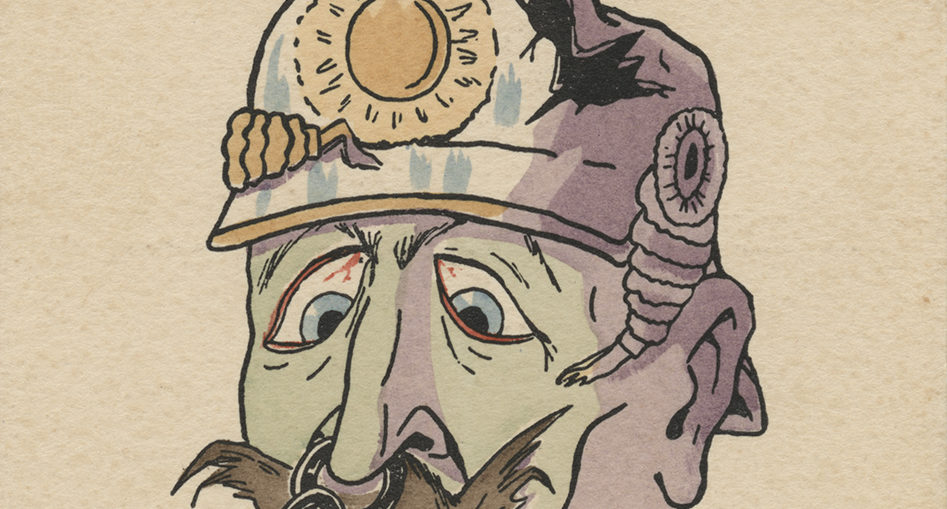
O HAI!

It’s your old pal Beerguyrob, and I’ve asked Seamus if I could host tonight’s Friday soiree, since I have a particular interest in the date. He was a surprisingly tough negotiator,

because Fridays are near & dear to his heart. But after sweetening the offer once

or twice,

I was able to convince him of the purity of my vision.
Thus, the alcoholic is in charge of your Friday evening, gripping the wheel & keeping it between the ditches. JUST LIKE WHEN YOU WERE A CHILD!
Anyway, as you recall, I’ve been using 2018 as an excuse to put my history degree to good use and present various important 1918 World War One battles and incidents in respect of the centenary of that terrible conflict. Well, with Remembrance / Armistice / Veterans Day coming this Sunday, I figured I would take this opportunity to have one last kick at the can, and present the most obscure of the topics I researched, but one that’s actually dear to my heart because it involves literal minutiae of history.
November 9, 1918: Kaiser Wilhelm II Abdicates

On September 30, 1918, the German military command informed the civilian government that the war was essentially lost, due to the Entente Powers overwhelming military superiority – in large part because of the arrival of the Americans en masse between April 1917 and January 1918. They requested the civilian government begin peace negotiations; in response, the civilian government resigned. In the aftermath, on October 3rd Prince Maximilian of Baden was installed as Chancellor and he began correspondence with US President Wilson regarding surrendering based upon his “Fourteen Points”.
[Prince Maximilian of Baden was no idiot. He knew that the British & French meant to punish Germany for its conduct during the war, and make Germany “pay” for “starting the war”, in the European custom of forcing the loser to compensate the “victor” for all costs incurred during the conflict. He hoped that Wilson would have influence in preventing Germany from being pillaged by its conquerors.]

Wilson indicated that negotiations could only begin upon the abdication of the Kaiser. Prince Max wrote to the Kaiser on November 6th asking him to accede to this demand, as it was the only way to prevent the war from entering German soil. He also pointed out to Wilhelm that a revolution (not unlike that which swept Russia) was beginning to foment on the streets of major German cities, having been triggered by the Kiel Mutiny on November 3rd. Instead, the Kaiser argued that he should head to the front and lead German forces back into Germany, allowing him to be viewed as a solemn figurehead – which he hoped would allow him to resign as German emperor but keep his title as King of Prussia. To counter this stance, Chancellor Prince Max had the German command inform the Kaiser that they could not guarantee his safety out in the field, and that the soldiers would not march behind him if it was to be seen helping him retain his throne; the Kaiser dropped the issue and fled to military headquarters in German-occupied Belgium.
On November 7th, Chancellor Prince Max went to meet the head of the largest political party in Germany, Social Democratic leader Friedrich Ebert, to discuss transition to a civilian government. Ebert felt that the best way to prevent a communist revolution was for the Kaiser to swiftly abdicate and for a civilian government – initially led by him, with elections to follow – to take over and begin armistice negotiations with the Western allies.
Word was sent to the Kaiser about these conditions.

While he vacillated on a response – he still hoped to retain his Prussian title – on November 9, 1918, Prince Max and Social Democratic politician Philipp Scheidemann made separate speeches announcing the Kaiser’s abdication, something that had not officially happened yet. Prince Max made his speech to hurry the Kaiser up; Philipp Scheidemann made his speech in response to communist threats to unilaterally declare a German soviet republic. Prince Max then resigned as Chancellor, Ebert took over and declared a German republic, and the army informed the Kaiser that they would not prevent him being captured and turned over to the Allies.
The Kaiser then announced his abdication and fled to The Netherlands, under the protection of Queen Wilhelmina, a distant cousin via Anne, Princess Royal and Princess of Orange, the eldest daughter of King George II (reign: 1727-60), who is of the Hanover line of English monarchs. Under the new Republic, all other regional German kings, princes & dukes were forced to relinquish their royal titles. His abdication was formally published on November 28, 1918, ending the reign of the German monarchy.

He lived out his days in exile, prohibited from leaving The Netherlands due to articles in the Treaty of Versailles demanding his trial for war crimes. He lived in Huis Doorn, an estate he purchased from Baroness Ella van Heemstra – the mother of Audrey Hepburn.
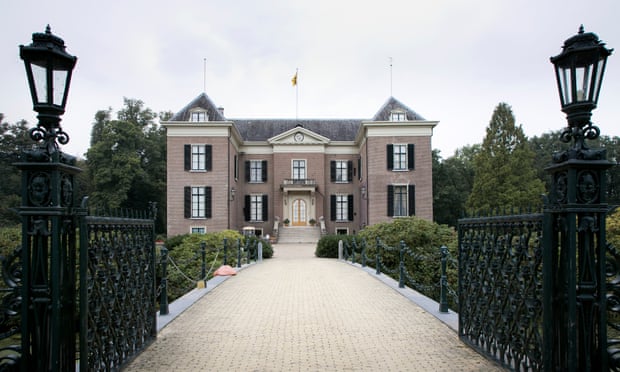
The Dutch government allowed Wilhelm II to remain in Netherlands under strict conditions:
- He had to stay in House Doorn and was only allowed to move freely within a radius of 15 kilometers around the House.
- He had to refrain from making political statements and his mail was regularly checked.
- He was also under permanent police surveillance.
————————————————————
[In 1919, during the Versailles negotiations, the Allied governments – led by Britain, France, Italy, United States and Japan – established a “Commission of Responsibilities” to make recommendations about trying German leaders for violations of international law during the course of the war. In the Treaty of Versailles, Articles 227-230 outline these conditions and procedures. {FYI – Article 231, the “War Guilt clause”, is the most famous tract in the Treaty, and is what most historians point to when looking for causes of World War Two.} Article 227 specifically made mention of the Kaiser as a “war criminal” and demanded his extradition from The Netherlands for the purposes of being put on trial for crimes committed in his name during the war. The request for extradition was made on June 28, 1919, the day the Treaty was signed; the Dutch refused, claiming that act would violate their neutrality.
The Leipzig War Crimes trials went on from May 23 to July 16, 1921. Over 900 names were presented for possible trial; only 12 were actually brought forward. Since I’m lazy, here’s what Wikipedia had to say about their trials:
- Sergeant Karl Heynen, charged with mistreating British POWs. He was sentenced to a brief prison term of ten months.
- Captain Emil Müller, charged with mistreating POWs. He was sentenced to six months in prison.
- Private Robert Neumann, charged with mistreating prisoners of war. He was sentenced to six months in prison.
- Commander Karl Neumann of U-boat UC-67 who sank the hospital ship Dover Castle in compliance with superior orders. He was found not guilty due to the fact that he was following orders.
- First-Lieutenants Ludwig Dithmar and John Boldt, charged with war crimes on the high seas. They were two officers of the submarine SM U-86 that had sunk the Canadian hospital ship Llandovery Castle and then machine-gunned survivors in the lifeboats. They were each sentenced to four years in prison.
- Their commanding officer, Helmut Brümmer-Patzig, had fled to the Free City of Danzig and was never prosecuted.
- Max Ramdohr, charged with crimes against the civilian noncombatants in occupied Belgium. He was found not guilty.
- Lieutenant-General Karl Stenger and Major Benno Crusius, charged with mistreating French POWs. Stenger was found not guilty, while Crusius was sentenced to two years in prison.
- First-Lieutenant Adolph Laule, charged with crimes against the civilian population of occupied France. He was found not guilty.
- Lieutenant-General Hans von Schack and Major-General Benno Kruska, charged with mistreating POWs. Both were found not guilty.
The legacy of the Leipzig trials is that, although viewed as a failure because they didn’t put anyone of actual importance or command on trial, it did set a precedent for the post-WWII Nuremberg & Tokyo Trials.]
————————————————————
Throughout his life he believed that Jews were perversely responsible, largely through their prominence in the Berlin press and in leftist political movements, for encouraging opposition to his rule. Until his death in exile in 1941, the Kaiser spread venomous poison where he could: The Jews were to blame for his downfall, as were the socialists—he alone was right. (The Kaiser’s allegations against the Jews comes primarily from the stereotype of Jewish intellectuals being leading Russian and German communists.) He spent his time in exile harbouring a secret hope to return to Germany and resume his place of Prussian honour, or at the least serve as a figurehead over the new Republic.
Reflecting and encouraging the sentiments of all too many Germans, he saw in Hitler the new man chosen by providence, a savior after the treachery that had caused Germany’s defeat. His second wife, Hermine Reuss, maintained contact in Germany with influential people to discuss and prepare for a possible return. To this end, there was also contact with influential Nazis such as Hermann Göring (who visited Wilhelm in Doorn) and even Adolf Hitler. By all accounts, Hitler simply ignored these requests, because Hitler was a WWI soldier and blamed the Kaiser for Germany’s defeat, and eventually the Kaiser himself gave up hope of any return.
He died in June 1941, during the German occupation of The Netherlands. He was buried on the grounds of Huis Doorn, as he requested his remains not be returned to Germany until the monarchy had been restored.
Huis Doorn was seized by the Dutch government after WWII as a war prize, and is run today as a rijksmonument, or national heritage site.
Anyway, since it is Friday, and we still do the thing on Fridays, I figure I owe you some ladies.
In keeping with the historical theme, you have to start with the one everyone knows.

The Mata Hari, or Margaretha Geertruida “Margreet” MacLeod as the bishop knew her, was a Dutch exotic dancer and courtesan who was convicted of being a spy for Germany during World War I and executed by firing squad in France. Much of her backstory is lost to time, but she was separated from her Dutch husband – who refused to pay her alimony – and became a Parisian courtesan in order to avoid poverty.

Although she was executed by the French as a German spy, stronger evidence points to her having had “dalliances” with French generals, and her execution was a means to cover up her ability to have played both sides with men from both sides.
Now, if you like your ladies a little more German and a lot more inbred, well then – have I got a treat for you.
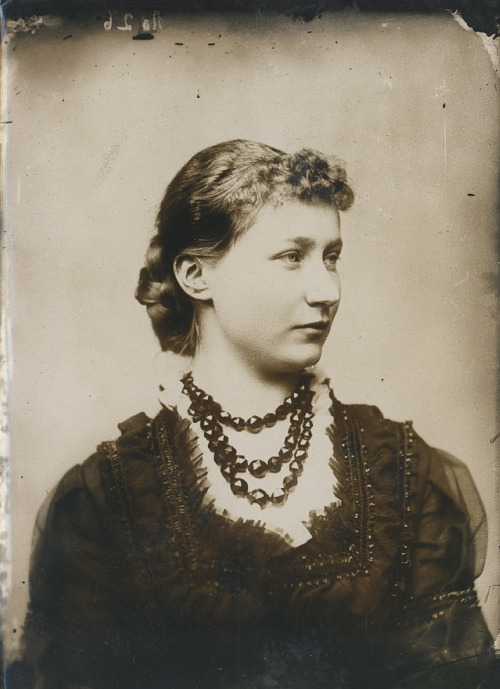

Augusta Victoria of Schleswig-Holstein, Empress of Germany & Queen of Prussia, was born in October 1858 in Sommerfeld, Prussia (now Lubsko, Poland). She became Crown Princess when Augusta married her second cousin Prince Wilhelm of Prussia in February 1881.
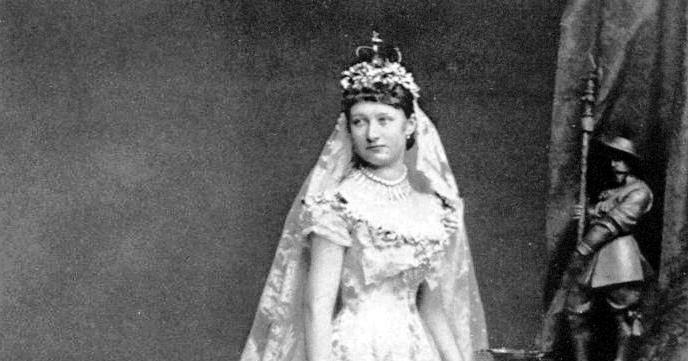
Proving all European royalty is a straight-line family tree, Augusta’s maternal grandmother Princess Feodora of Leiningen was the half-sister of Queen Victoria, who was Wilhelm’s maternal grandmother.
————————————————————
[She was not even his first choice. Wilhelm had earlier proposed to his first cousin, Princess Elisabeth of Hesse and by Rhine, a daughter of his mother’s own sister, and a granddaughter of Queen Victoria, but she declined.

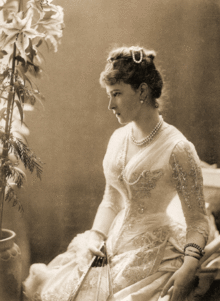

She later married Grand Duke Sergei Alexandrovich of Russia, great-uncle of Nicholas II, the last Tsar of Russia. He was the Governor of Moscow from 1891-1905, and during that period assisted in cracking down on intellectual dissent & expelling all of Moscow’s Jews. He was assassinated by a member of the Socialist Revolutionary Party in 1905, when a nitroglycerin bomb was thrown into his carriage, which landed in his lap & exploded. (The two theories about why he was chosen come down to either because he was the Commander & former Governor of the Moscow military district, or because he was a trusted aide & confidante to the Tsar.)
After his assassination, she fell into religious despair, selling off her royal jewels & forming a convent, the Convent of Saints Martha and Mary.

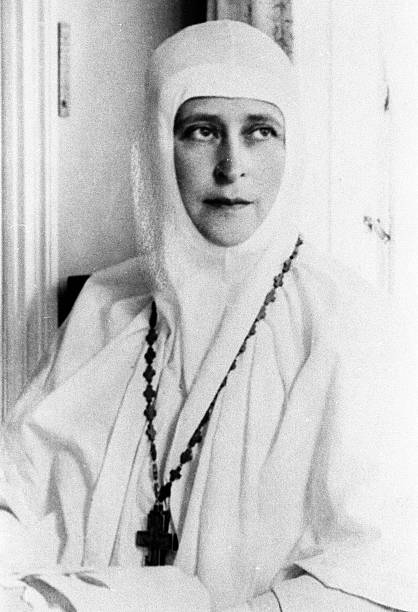
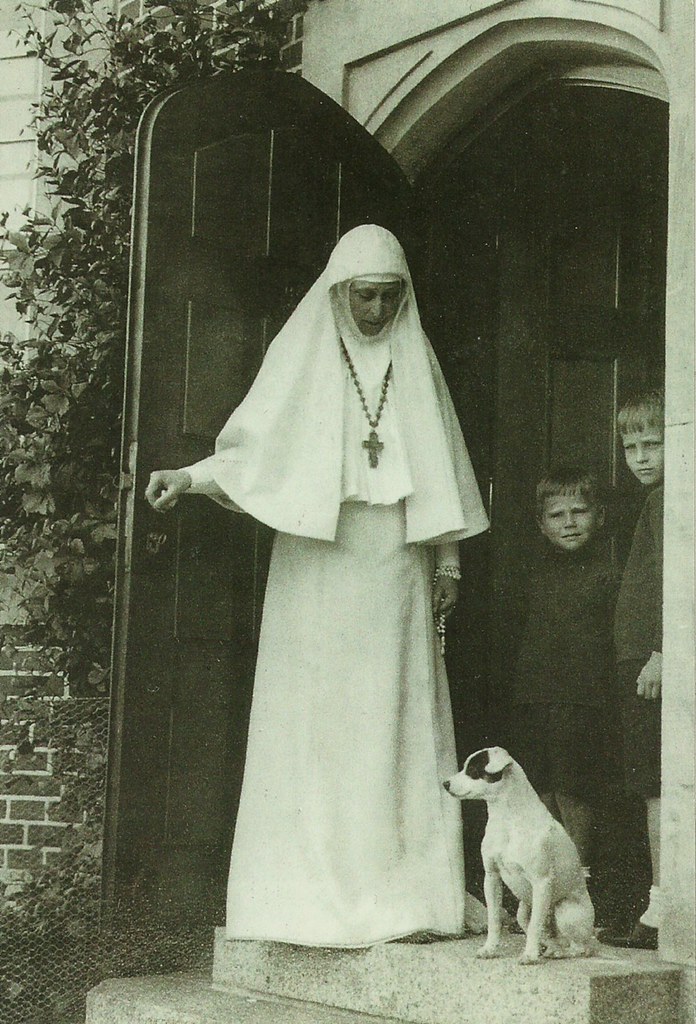
On those grounds she established a hospital, orphanage & pharmacy, all dedicated to helping the poor.
Despite her apparent renunciation of all royal offices, she was arrested by the Bolsheviks after the November 1917 revolution. She was executed along with the rest of the royal family in July 1918.
After the removal of the Communist government in December 1991,

![]()
the Russian Orthodox Church canonized her as a “Holy Martyr” in 1992.]
————————————————————
Empress Augusta Victoria had seven children, but only one daughter, Princess Victoria Louisa


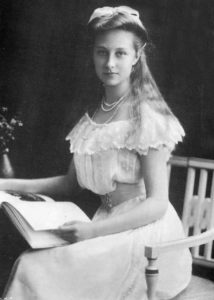
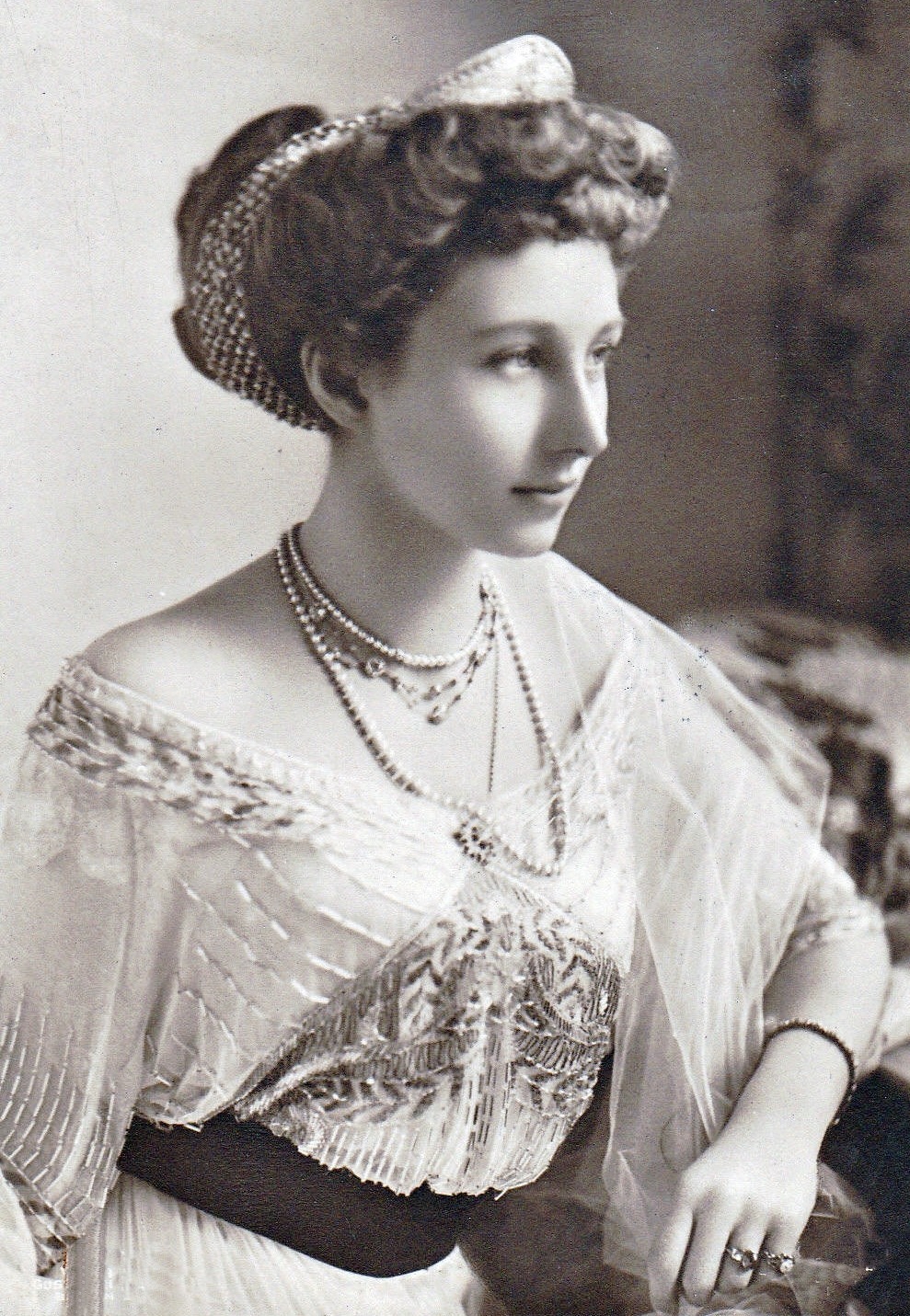
who was the last surviving direct descendant of the Kaiser,

dying in 1980 at age 98.
Each of her six sons married. Her eldest, Crown Prince Wilhelm, married Duchess Cecilie of Mecklenburg-Schwerin,

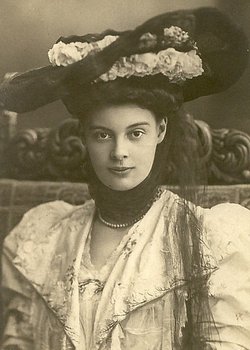

who was very popular amongst the people, and whom he cheated on regularly. A “Charles & Diana” of the early 20th Century.
Son #2 was Prince Eitel Friedrich, who married Duchess Sophia Charlotte of Oldenburg.



Their marriage was also unhappy. He was rumoured to have gotten married simply to silence theories about why he hadn’t married before then (i.e. – GAY), and it turned out she was sleeping with a guy, Baron von Plettenberg, right up until her marriage. In fact, in 1922 her husband sued German newspapers over allegations she had committed adultery during their marriage, and she testified in court about her pre-marital affair. Despite all of this, they divorced in 1926.
Her third son, Prince Adalbert, married the Princess Adelaide of Saxe-Meiningen,



who I could only find described as a “handsome woman”.
The Empress’ fourth son, Prince August Wilhelm, married his first cousin, Princess Alexandra Viktoria of Schleswig-Holstein-Sonderburg-Glücksburg.



Their marriage was also considered a front, as her husband’s “pronounced homophilic tendencies” with his childhood friend and personal adjutant, Hans Georg von Mackensen, led to their divorce in 1920, after the fall of the German monarchy.
Prince Oskar, son #5, actually married above his station, to the Countess Ina Marie von Bassewitz,



who actually had more titles than him, and was higher up in her line of succession than he was. So he punched above weight.
And her youngest son, Prince Joachim, married Princess Marie-Auguste of Anhalt,



by all accounts a purely rotten woman. Not only did she allegedly abandon her husband & son to run away with another man during the War – and had to be forcibly returned to avoid scandal – she divorced him immediately after the War ended, leading to his suicide. All of this put her on the outs in European circles, and she was forced to live a meagre existence. Towards the end of her life, she made money by “adopting” people who would pay her money monthly to become her “son” and thus use the title of “Prince”. (Despite the historical fact that women in the Anhalt royal line could not convey titles to their children, born or adopted, unless allowed under a special grant from the sovereign.) One of the reportedly 35 people who did this was Hans Robert Lichtenberg, who paid her 2000 DM/month (about $800/month in 1980) for his “title” and used his refashioned name of Frédéric Prinz von Anhalt to sway the attentions of serial Hollywood divorcée Zsa Zsa Gabor, becoming her ninth & final husband.
Finally, we return to Empress Augusta Victoria, who sat aside her husband as he led Germany into World War One,


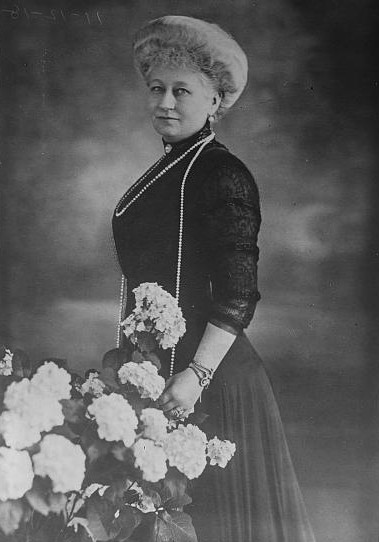
and as such was sent into exile with him at the end of the war. She died in exile at Huis Doorn, The Netherlands, in 1921.
He honoured her memory by remarrying a year later.
Tonight’s sports:
- NHL:
- Blue Jackets at Capitals – 7:00PM | Sportsnet1 / NHLN-US
- Wild at Ducks – 10:00PM | Sportsnet1
- NBA:
- Celtics at Jazz – 9:30PM | ESPN
- NCAA:
- Football:
- Louisville at Syracuse – 7:00PM | ESPN2
- Fresno State at Boise State – 10:15PM | ESPN2
- Basketball:
- Texas vs. Arkansas – 7:00PM | ESPN / TSN2
- the “Armed Forces Classic”
- *North Carolina at Elon – 7:00PM | ESPNU
- Buffalo at West Virginia – 9:00PM | ESPNU
- Texas vs. Arkansas – 7:00PM | ESPN / TSN2
- Football:
Thanks again to Seamus for allowing me to indulge my niche. HE’LL BRING HIS GAME BACK NEXT WEEK!



Best line ever.